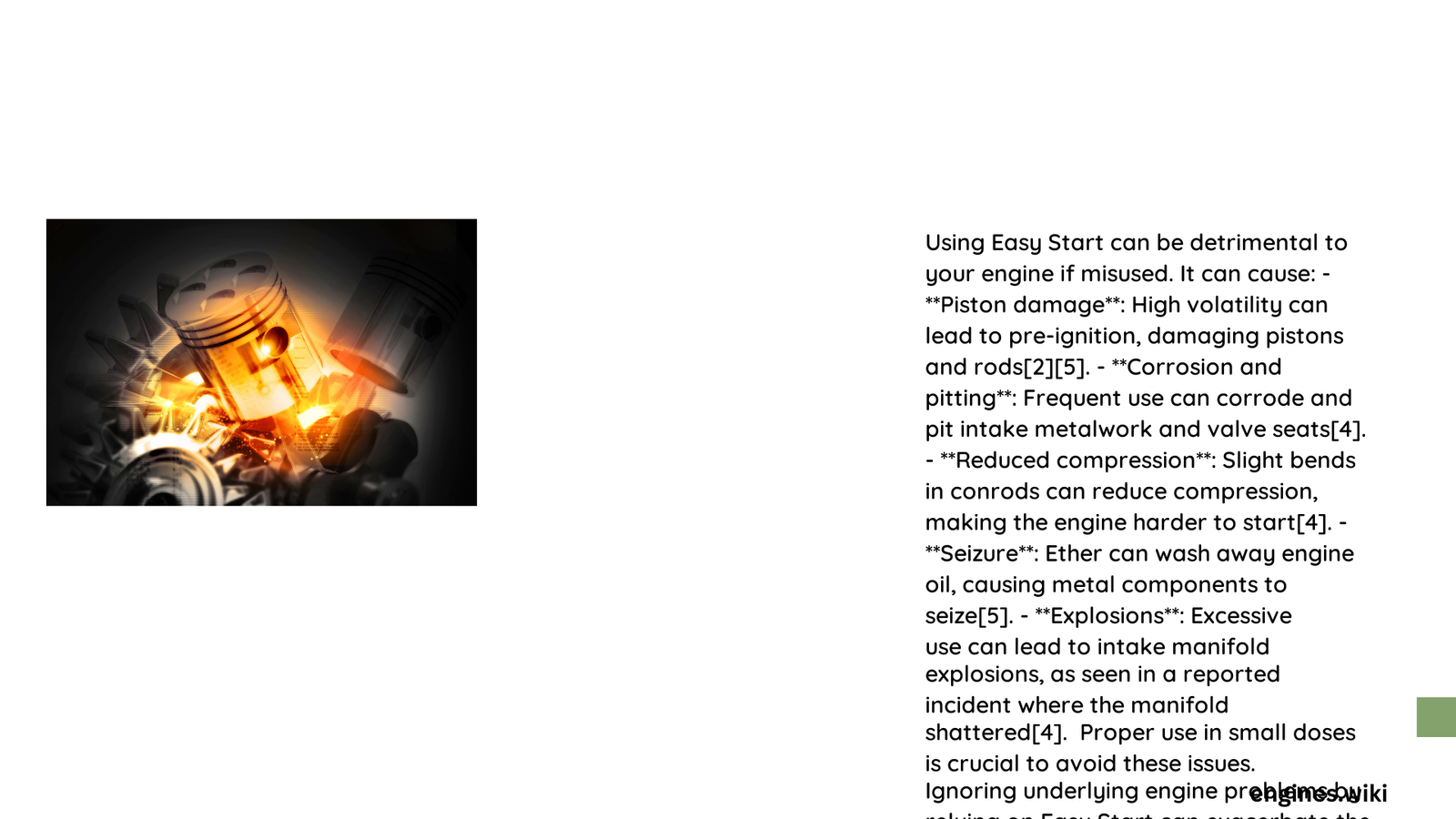Easy start products, primarily composed of volatile diethyl ether, pose significant risks to vehicle engines across gasoline and diesel platforms. These emergency starting aids can cause premature ignition, violent engine startups, and potential internal component damage. While seemingly convenient in cold conditions, repeated use can lead to catastrophic engine wear, reduced performance, and costly repairs. Understanding the nuanced mechanics behind these products is crucial for responsible vehicle maintenance and long-term engine health.
What Makes Easy Start Potentially Harmful?
How Does Easy Start Impact Gasoline Engines?
Easy start products can trigger multiple mechanical complications in gasoline engines:
- Premature Ignition Risks
- Causes engine knock and pinging
- Potential damage to pistons and cylinder walls
-
Disrupts normal combustion sequence
-
Mechanical Stress Factors
- Violent engine startup
- Potential bending of connecting rods
- Increased internal component strain
What Specific Dangers Exist for Diesel Engines?
Diesel engines face more pronounced risks from easy start products:
| Risk Category | Potential Consequences |
|---|---|
| Compression Ratio Impact | Higher likelihood of catastrophic damage |
| Lubrication Concerns | Accelerated piston wear |
| Combustion Irregularities | Premature ignition during compression stroke |
Can Easy Start Cause Long-Term Engine Damage?
Critical long-term engine damage mechanisms include:
- Cylinder bore drying
- Metalwork corrosion
- Valve seat deterioration
- Reduced overall engine lifespan
What Alternatives Exist for Cold-Start Challenges?
Recommended alternatives include:
- Specialized starting fluids designed for specific engine types
- Proper engine maintenance
- Addressing underlying mechanical issues
- Using heater plugs for diesel engines
- Implementing proper winter preparation techniques
Technical Insights into Easy Start Composition

Why Is Diethyl Ether Problematic?
Diethyl ether’s chemical properties create significant engine stress:
– Extremely high volatility
– Rapid combustion characteristics
– Minimal lubricating properties
– Potential for uncontrolled expansion
How Frequently Can Easy Start Be Used?
Expert recommendations suggest:
– Absolute minimum usage
– Only in emergency situations
– Never as a regular starting method
– Immediate professional inspection after usage
Preventative Maintenance Strategies
What Steps Protect Your Engine?
Comprehensive engine protection involves:
– Regular maintenance checks
– Using manufacturer-recommended starting procedures
– Understanding your specific engine’s requirements
– Investing in quality lubricants
– Addressing starting issues proactively
Economic Considerations
What Are the Potential Repair Costs?
Potential repair scenarios range from:
– Minor component replacement: $500 – $2,000
– Significant engine damage: $3,000 – $10,000
– Complete engine replacement: $4,000 – $8,000
Professional Recommendations
When Should You Avoid Easy Start?
Avoid easy start in these scenarios:
– Modern fuel-injected engines
– Engines with known mechanical vulnerabilities
– Vehicles under warranty
– Regular maintenance-neglected vehicles
Final Technical Assessment
Easy start products represent a high-risk, low-reward solution for engine starting challenges. While momentarily convenient, the potential for long-term damage far outweighs any perceived short-term benefits.
Key Takeaway
Prioritize proper maintenance, understand your engine’s specific requirements, and consult professional mechanics when experiencing persistent starting difficulties.
